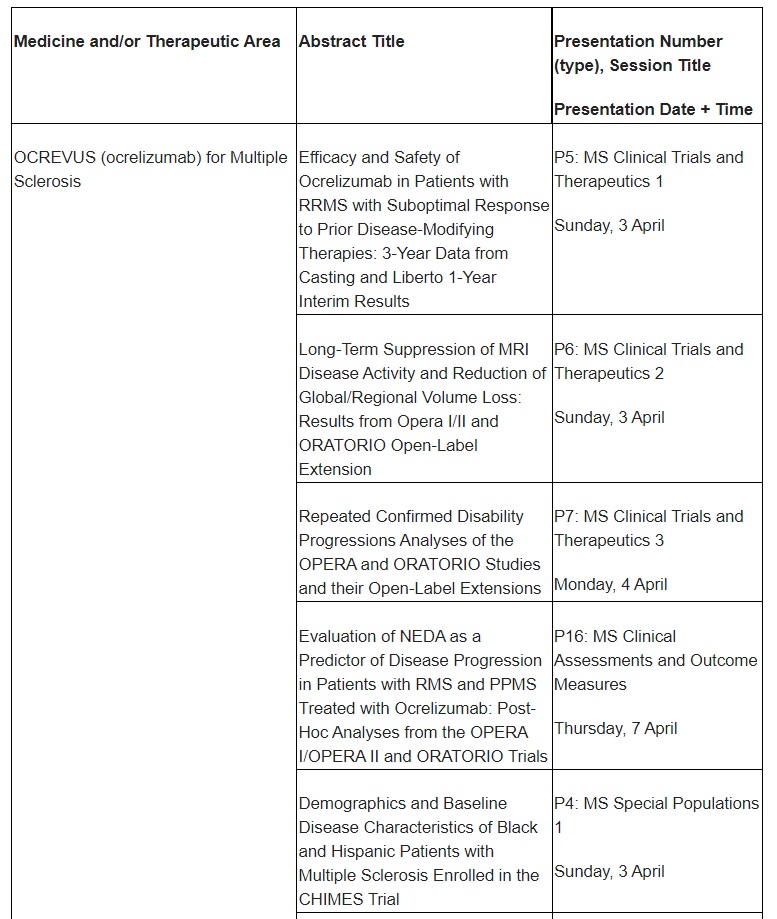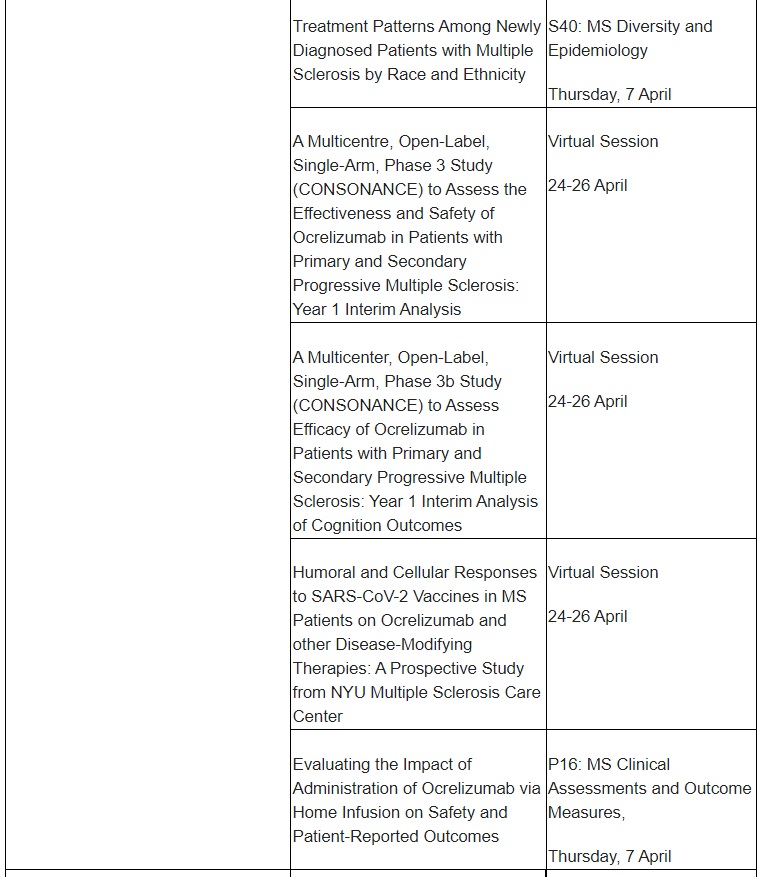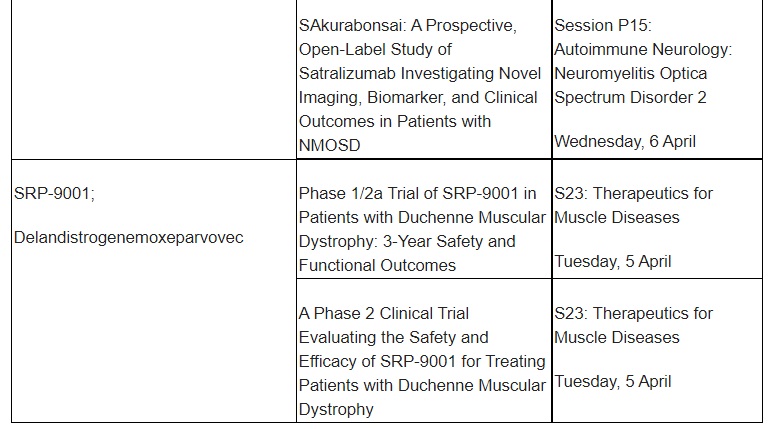
First data showing OCREVUS treatment effect on disability progression in non-active secondary progressive multiple sclerosis and further data in primary progressive MS will be presented
Evrysdi data continue to demonstrate long-term efficacy and safety in a broad population of people with spinal muscular atrophy
Longer-term efficacy and safety for Enspryng in neuromyelitis optica spectrum disorder reinforce previously seen results
Additional data across neurological disorders, including Alzheimer’s disease, help advance the scientific understanding of these conditions and the potential impact of early treatment
Basel, 25 March 2022 - Roche (SIX: RO, ROG; OTCQX: RHHBY) today announced new data for its approved and investigational medicines across neurological disorders will be presented at the 74th American Academy of Neurology (AAN) Annual Meeting being held 02-07 April in Seattle and virtually 24-26 April 2022. These data include twenty-four abstracts highlighting Roche’s expansive neuroscience portfolio across five therapeutic areas, including OCREVUS® (ocrelizumab) in relapsing, secondary and primary progressive multiple sclerosis (RMS, SPMS and PPMS), EVRYDSI™ (risdiplam) in spinal muscular atrophy (SMA), ENSPRYNG™ (satralizumab) in neuromyelitis optica spectrum disorder (NMOSD), along with data from investigational programs in Alzheimer’s disease (AD) and Duchenne muscular dystrophy (DMD).
“The longer-term efficacy and safety data for OCREVUS, EVRYSDI and ENSPRYNG, as well as findings from diverse and underrepresented populations, demonstrate the significant impact of our expanding neuroscience portfolio,” said Levi Garraway, M.D., Ph.D. Roche's Chief Medical Officer and Head of Global Product Development. “We remain committed to advancing the science and improving the lives of people living with neurological conditions.''
Multiple Sclerosis
Roche will present 11 abstracts on MS and OCREVUS at AAN. New data from the one-year interim analysis of CONSONANCE, a first-of-its-kind open-label Phase III trial, will show the treatment effect of OCREVUS in the complete spectrum of progressive MS – SPMS and PPMS – with novel composite disability endpoints.
Additionally, an analysis of a U.S. claims database will highlight treatment disparities between Black and Hispanic/Latino-American patients and non-Hispanic white patients in the two years after diagnosis. Addressing health inequity and inclusion in research is central to Roche’s mission to improve patient health outcomes. The insights from the data presented at AAN reinforce the importance of Roche’s CHIMES trial evaluating OCREVUS in Black and Hispanic patients with MS, which is now fully enrolled across sites in the U.S. and Kenya.
Spinal Muscular Atrophy
Roche will present encore data from the clinical development programme for EVRYSDI, including 3-year data from SUNFISH Part 1 and 2, highlighting the long-term efficacy and safety of EVRYSDI in people aged 2-25 years with Type 2 or Type 3 SMA. In addition, updated interim efficacy data from the RAINBOWFISH study in presymptomatic infants with SMA will be presented. The clinical development programme represents the broad real-world spectrum of people living with SMA from newborn babies to people aged 60 years old.
Roche will also share the design of the new MANATEE trial, a multi-centre, randomised, placebo-controlled, double-blind study studying GYM329, an investigational anti-myostatin, in combination with EVRYSDI.
Neuromyelitis Optica Spectrum Disorder
Roche will present encore long-term efficacy and safety data from the ENSPRYNG SAkuraSky and SAkuraStar studies. These data reinforce the previously observed efficacy and safety of ENSPRYNG, the first and only approved treatment designed to target and inhibit the IL-6 receptor activity, and that can be administered subcutaneously every four weeks at home after training from a healthcare provider.
To increase the scientific understanding of NMOSD and improve care for all people living with the condition, Roche has initiated SAkuraBONSAI, a multi-centre, Phase IIIb, international study evaluating ENSPRYNG treatment for people with AQP4-IgG seropositive NMOSD who are treatment naïve, or where prior rituximab (or biosimilar) treatment has failed*; SAkuraBONSAI will further evaluate disease activity and progression using comprehensive imaging, biomarker and clinical assessment.
Alzheimer’s Disease
Roche will present updates from its AD clinical programme, including baseline characteristics of the Phase III GRADUATE studies in patients with early AD.
In addition, the design of the post-GRADUATE open label rollover study evaluating the long-term safety, tolerability and efficacy of gantenerumab in patients from the GRADUATE 1 and 2 studies will be presented.
For more than two decades, Roche has been studying and developing gantenerumab, a late-stage investigational subcutaneously-administered monoclonal antibody, for the treatment of AD. Data from the pivotal GRADUATE trials are expected in the fourth quarter of 2022. Gantenerumab is also being evaluated in the Phase III SKYLINE prevention trial to better understand the potential of the investigational therapy to slow disease progression in people with the earliest biological signs of AD.
The full range of data from Roche’s clinical development programme in neuroscience being presented at 2022 AAN include:





About OCREVUS® (ocrelizumab)
OCREVUS is the first and only therapy approved for both RMS (including RRMS and active, or relapsing, SPMS and CIS in the U.S.) and PPMS, with six-month dosing. OCREVUS is a humanised monoclonal antibody designed to target CD20-positive B cells, a specific type of immune cell thought to be a key contributor to myelin (nerve cell insulation and support) and axonal (nerve cell) damage. This nerve cell damage can lead to disability in people with MS. Based on preclinical studies, OCREVUS binds to CD20 cell surface proteins expressed on certain B cells, but not on stem cells or plasma cells, suggesting that important functions of the immune system may be preserved. OCREVUS is administered by intravenous infusion every six months. The initial dose is given as two 300 mg infusions given two weeks apart. Subsequent doses are given as single 600 mg infusions.
About EVRYSDI™ (risdiplam)
EVRYSDI is a survival of motor neuron 2 (SMN2) splicing modifier designed to treat SMA by increasing and sustaining the production of the survival motor neuron (SMN) protein in the central nervous system (CNS) and peripheral tissues. SMN protein is found throughout the body and is critical for maintaining healthy motor neurons and movement. EVRYSDI is administered daily at home in liquid form by mouth or by feeding tube.
The U.S. Food and Drug Administration (FDA) approved EVRYSDI for the treatment of SMA in adults and children 2 months of age and older. EVRYSDI was granted PRIME designation by the European Medicines Agency (EMA) in 2018 and Orphan Drug Designation by FDA and EMA in 2017 and 2019, respectively. At this time, EVRYSDI has been approved in 76 countries and submitted in a further 29 countries.
About ENSPRYNGTM (satralizumab)
ENSPRYNG, which was designed by Chugai, a member of the Roche Group, is a humanized monoclonal antibody that targets interleukin-6 (IL-6) receptor activity. The cytokine IL-6 is believed to be a key driver in NMOSD disease processes, triggering the inflammation cascade and leading to damage and disability. ENSPRYNG was designed using novel recycling antibody technology. When compared to conventional antibodies, ENSPRYNG’s recycling antibody technology enables the medicine to remain in the bloodstream for a longer period of time and bind repeatedly to its target (the IL-6 receptor) - maximally sustaining IL-6 suppression in a chronic disease like NMOSD and enabling subcutaneous dosing every four weeks.
Positive Phase III results for ENSPRYNG, as both monotherapy and in combination with baseline immunosuppressive therapy, demonstrate that IL-6 inhibition is an effective therapeutic approach for patients with NMOSD who are AQP4-IgG seropositive. The Phase III clinical development program for ENSPRYNG includes two studies: SAkuraStar and SAkuraSky.
ENSPRYNG is currently approved in 63 countries, including the United States, Canada, Japan, South Korea and the European Union.
ENSPRYNG has been designated as an orphan drug in the United States, Europe, Japan and Russia. In addition, it was granted Breakthrough Therapy Designation for the treatment of NMOSD by the FDA in December 2018, which is given to treatments that may demonstrate substantial improvement over other available options.
About Roche in neuroscience
Neuroscience is a major focus of research and development at Roche. Our goal is to pursue groundbreaking science to develop new treatments that help improve the lives of people with chronic and potentially devastating diseases.
Roche is investigating more than a dozen medicines for neurological disorders, including multiple sclerosis, Alzheimer’s disease, Huntington’s disease, Parkinson’s disease, Duchenne muscular dystrophy and autism spectrum disorder. Together with our partners, we are committed to pushing the boundaries of scientific understanding to solve some of the most difficult challenges in neuroscience today.
About Roche
Roche is a global pioneer in pharmaceuticals and diagnostics focused on advancing science to improve people’s lives. The combined strengths of pharmaceuticals and diagnostics under one roof have made Roche the leader in personalised healthcare – a strategy that aims to fit the right treatment to each patient in the best way possible.
Roche is the world’s largest biotech company, with truly differentiated medicines in oncology, immunology, infectious diseases, ophthalmology and diseases of the central nervous system. Roche is also the world leader in in vitro diagnostics and tissue-based cancer diagnostics, and a frontrunner in diabetes management.
Founded in 1896, Roche continues to search for better ways to prevent, diagnose and treat diseases and make a sustainable contribution to society. The company also aims to improve patient access to medical innovations by working with all relevant stakeholders. More than thirty medicines developed by Roche are included in the World Health Organization Model Lists of Essential Medicines, among them life-saving antibiotics, antimalarials and cancer medicines. Moreover, for the twelfth consecutive year, Roche has been recognised as one of the most sustainable companies in the Pharmaceuticals Industry by the Dow Jones Sustainability Indices (DJSI).
The Roche Group, headquartered in Basel, Switzerland, is active in over 100 countries and in 2020 employed more than 100,000 people worldwide. In 2020, Roche invested CHF 12.2 billion in R&D and posted sales of CHF 58.3 billion. Genentech, in the United States, is a wholly owned member of the Roche Group. Roche is the majority shareholder in Chugai Pharmaceutical, Japan